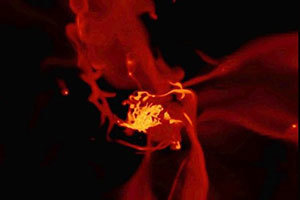 Gas cloud simulation.
Gas cloud simulation.
Credit: Michele Fumagalli
Expert physicists from around the world are coming together Thursday (Jan. 30) through Saturday (Feb. 1) for the Circumgalactic-Medium Workshop at Notre Dame. The workshop, titled “The Impact of Gas Fueling, Quenching and Feedback on the Growth of Galaxies,” will meet in McKenna Hall at the University of Notre Dame.
During the workshop, theorists and observers from the United Kingdom, Germany, France, South Africa and major institutes and universities in the United States will lead group discussions on topics such as the most important physical processes that drive galaxy evolution — fueling, quenching and feedback. They will address the physics that dominates galaxy evolution and the signatures of the important physical processes in the gas that surrounds galaxies.
The workshop presenters also will lead discussions that address questions such as the following: Do all simulations recover a very large component of circumgalactic-medium recycling? How much of low-redshift star formation is powered by gas that has been recycled? How can observers study this phenomenon? Do various galaxy simulations agree on gas accretion through cold and hot flows? What are the observable consequences of such flows? What causes quenching of star formation in galaxies, and can simulations capture it? What does it do to the circumgalactic medium, and what are its observable consequences? Do cosmological simulations make other predictions that can be observationally tested? How can researchers bring simulations and observations a step closer in the future?
Chris Howk, associate professor of physics, said the workshop brings together “researchers who are focused on using observations to probe galaxies with those who develop simulations of galaxy evolution. In doing so, we’re trying to help these two groups understand what the others are seeing, what problems and limitations each community sees in its work, and how we might work together to move forward. Such intense, specialized meetings are critical for making breakthroughs in areas like galaxy evolution, where researchers use such a wide range of techniques that it is difficult to understand the shortcomings in these techniques as an outsider. The hope is that we can help each other as we come to understand the issues that we all face."
“Having this conference at Notre Dame is great. It gives our graduate students a great chance to participate in discussions of cutting-edge research and helps them find their place in international effort to understand how galaxies evolve,” Howk said.
The conference is organized by Howk and Nicolas Lehner from the University of Notre Dame, John O’Meara from Saint Michael’s College, Ben Oppenheimer from the University of Colorado, Brian O’Shea from Michigan State University and Jason Tumlinson from the Space Telescope Science Institute. It is sponsored by the College of Science, Office of Research and the Department of Physics at the University of Notre Dame. The workshop schedule is available online.
Contact: Marissa Gebhard, 574-631-4465, Gebhard.3@nd.edu